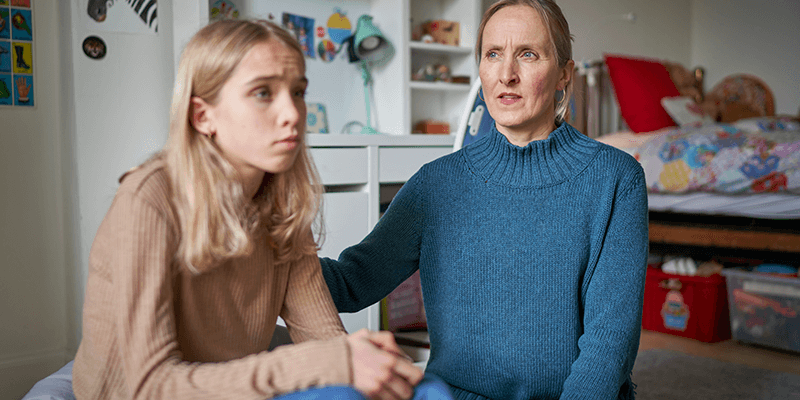All teenagers can be moody, withdrawn or anxious from time to time. This is perfectly OK – their emotions and hormones are all over the place! And trying to become more independent and grow into an adult can be hard. But sometimes their behaviour may be challenging because there’s something wrong. So how do you tell the difference between what is considered usual teenage behaviours and something that suggests they may be struggling? Here are some things to look out for.
Typical behaviour
- It’s not at all unusual for teens to experiment. This can be with anything from clothes and music, to sex and alcohol. While we might not like it, this is typical behaviour for teenagers. Keeping them safe is the most important thing that we can do, and the best way to do this is to have open and honest conversations with them.
- Teenagers often struggle with their identity. Changing their appearance to keep up with trends or try out different identities is important for teenagers, and is part of them finding out who they are.
- Teenagers are experiencing lots of new emotions and their moods can be all over the place. They feel these strongly and don’t necessarily have the ways to cope with them that grown ups have. Often they don’t know why they feel the way they do so they can’t explain what’s wrong. This sometimes means they can react dramatically to small things. It can be difficult and upsetting for you, but it is normal.
- Teenagers often feel awkward. This can be because of the changes that are happening to their bodies, making them feel uncomfortable socially even with friends. They can also swing between overconfidence and low self-esteem in a heartbeat, so don’t worry if one day they’re telling you they don’t care what you think and the next they’re needing reassurance about everything.
- Teens usually start placing more importance on relationships outside the family, which means they can sometimes seem as if they’re withdrawing a bit from family life. They may not talk to you as often as they used to, and may pull away, or not want to be seen in public with you. They may feel the need to have different opinions from you, to help assert their independence, and their friends may have a more important role in the decisions they make. This is a normal part of learning how to be an independent adult, but can be difficult for parents. But it doesn’t mean you can’t be there for them. Take a look at our page on feeling prepared for the teen years for some tips.
- You may notice your teen having more arguments with friends and family. They might accuse you of not loving them, or get very angry that their friends are allowed to do things they aren’t. This is not unusual, if not nice for you. Remember, they don’t really mean it, they’re just testing the boundaries, to see how you’ll react. Our page on dealing with conflict has lots of tips for defusing arguments.
- If your family is going through a lot of changes – for example, if you’re moving to a new area, you and your partner are separating, or a family member is ill – this can also impact on your teenager and affect their behaviour. Likewise, events at school or in their online lives, like arguments with friends or bullying, may be upsetting them. The best thing you can do in these situations is talk to them about it. Mention that you’ve noticed they’re not themselves, and ask them if there’s anything wrong. And if they push you away at first, let them know you’re there for them whenever they’re ready to talk.
Spotting the signs that your teen may be struggling
Knowing when something is more than just typical teenage behaviour can be hard. How do you know when these are signs of something more serious? Here are some key things to look out for:
- Really dramatic changes in the way they behave. Not acting like themselves, or acting in a way you haven’t seen before. For example, if a usually outgoing teen suddenly becomes quiet and withdrawn or steps back from friendships, this could be a sign that something is wrong.
- Displaying out-of-character emotions such as apathy, agitation, sadness or anger. Having a hard time falling or staying asleep, or sleeping much more than usual.
- Changes in appearance beyond the usual changes to follow trends or express themselves. For example, this could be a sudden neglect of personal hygiene or if their weight changes dramatically.
- Doing risky and reckless things, like taking drugs or drinking too much alcohol. Our section on teens and risk-taking behaviour has more information on why teens are prone to taking risks and how you can help them make informed decisions.
- If they are always extremely bored and can never seem to entertain themselves, this could be a sign of depression. Our page on low mood and depression has more information and advice that can help.
- If they seem to be more anxious or sad than usual this could be a sign that something is wrong.
- If they get aggressive. Teens can’t always control their emotions, and sometimes anger can spill over into aggression and even violence. Our page on dealing with conflict has tips on dealing with angry teens, but this kind of behaviour is also a sign that there could be a larger issue causing it.
- Refusing to follow rules and arguing about everything, even the small things.
- Never taking any responsibility for their actions.
- A loss of interest in things they usually like to do. It’s perfectly natural for their hobbies and interests to change as they grow up, but if they suddenly drop everything they were once passionate about, this may be a sign that something isn’t right.
- Changes in appetite, weight or eating patterns. Our page on eating disorders has more information if you're concerned about your teen's diet.
- Problems with memory, thinking, or concentration.
- Less interest in schoolwork. Our page on school avoidance has more advice if your teen is refusing to go to school.
What should I do if I notice any of these things?
The most important thing is not to panic. Your teenager may be displaying one or more of these things and it may not mean anything, it may just be typical teenage behaviour. But if the changes are pretty consistent or you’ve noticed a change that has lasted for two weeks or more then it may mean there is something up. Starting a conversation and asking them if they’re okay is the first step. If you’re worried, there are things you can do to help them, and lots of organisations who can support you. You may also find this leaflet from SAMH helpful.
In this short film, Professor Cathy Richards, Consultant Clinical Psychologist, shares advice on spotting signs that your child or teenager may be struggling with their mental health and explains what you can do to help.
 Activities & Play
Activities & Play Behaviour
Behaviour Childcare
Childcare Development & Growing Up
Development & Growing Up Family, Friends & Relationships
Family, Friends & Relationships Feeding Your Baby
Feeding Your Baby Food & Eating
Food & Eating Health & Safety
Health & Safety Mental Health & Wellbeing
Mental Health & Wellbeing Money & Work
Money & Work Online Behaviour & Safety
Online Behaviour & Safety Pregnancy & First Days
Pregnancy & First Days School & Education
School & Education Sleep
Sleep










 Family, Friends & Relationships
Family, Friends & Relationships
 Mental Health & Wellbeing
Mental Health & Wellbeing